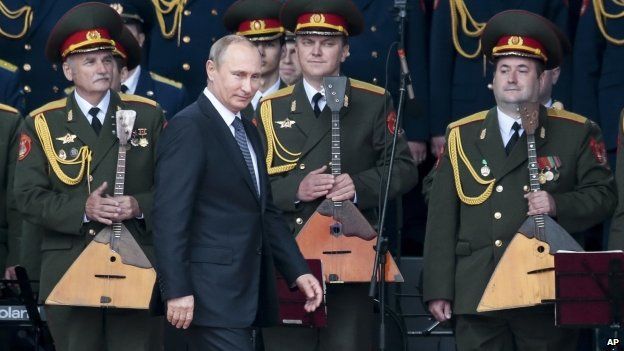Putin: Russia to boost nuclear arsenal with 40 missiles
- Published

President Vladimir Putin has said Russia will put more than 40 new intercontinental ballistic missiles into service this year.
It is part of a wide-reaching programme to modernise the country's military.
The move comes after the US proposed increasing its military presence in Nato states in Eastern Europe.
Nato has condemned the Russian announcement, saying the move amounted to "nuclear sabre-rattling" and was "unjustified" and "dangerous".
Tensions are high over Russia's role in the conflict in eastern Ukraine.
Speaking at an arms fair, Mr Putin said the weapons would be able to overcome even the most technically advanced anti-missile defence systems.
Nato and Western leaders accuse Russia of sending soldiers and heavy weapons, including tanks and missiles, to the pro-Russian separatists in eastern Ukraine. Russia has repeatedly denied this, insisting that any Russians fighting there are "volunteers".
Later on Tuesday, Nato Secretary-General Jens Stoltenberg said that the statement from Mr Putin was "confirming the pattern and behaviour of Russia over a period of time; we have seen Russia is investing more in defence in general and in its nuclear capability in particular".
He said: "This nuclear sabre-rattling of Russia is unjustified, it's destabilising and it's dangerous."
He added that "what Nato now does in the eastern part of the alliance is something that is proportionate, that is defensive and that is fully in line with our international commitments."
Russia nuclear arsenal
- Military stockpile of approximately 4,500 nuclear warheads
- These include nearly 1,800 strategic warheads deployed on missiles and at bomber bases
- Another 700 strategic warheads are in storage along with roughly 2,700 non-strategic warheads
- A large number - perhaps 3,500 - of retired, but still largely intact warheads await dismantlement
All numbers are approximate estimates
Source: Federation of American Scientists
'Arms race'
Russia has increased its defence spending substantially under Vladimir Putin, and is in the midst of a massive modernisation programme, says the BBC's Sarah Rainsford in Moscow.
The missiles are hi-tech replacements, not additions to Russia's nuclear arsenal, but the nod to the US is clear, our correspondent says.
Russian officials have warned that Moscow will respond if the US carries out its plan to store heavy military equipment in Eastern Europe, including in the Baltic states that were once part of the Soviet Union.
"The feeling is that our colleagues from Nato countries are pushing us into an arms race," RIA news agency quoted Russian Deputy Defence Minister Anatoly Antonov as saying on the sidelines of the arms fair outside Moscow.
Analysis - Jonathan Marcus, BBC News defence and diplomatic correspondent
Amidst the rising tensions with the West, Russian President Vladimir Putin has placed a renewed emphasis upon his country's nuclear arsenal.
This is in part a reflection of Russia's continuing conventional military weakness. Moscow is in the midst of a significant modernisation of its strategic nuclear weapons with new ballistic missiles being deployed, more modern bombers, and new submarines being launched.
Over recent years, older, obsolete weapons have been withdrawn from service, so the size of Russia's overall arsenal has been shrinking.
However, this decline could soon come to an end, raising all sorts of questions for other nuclear powers.
What most alarms the West is the renewed emphasis in Russian rhetoric on nuclear rather than conventional forces.
Threats to deploy short-range nuclear weapons in Crimea have been accompanied by veiled warnings of nuclear targeting against Nato members who might host ballistic missile defences.
- Published15 June 2015
- Published17 April 2015
- Published6 April 2015
- Published5 March 2015
- Published5 February 2015